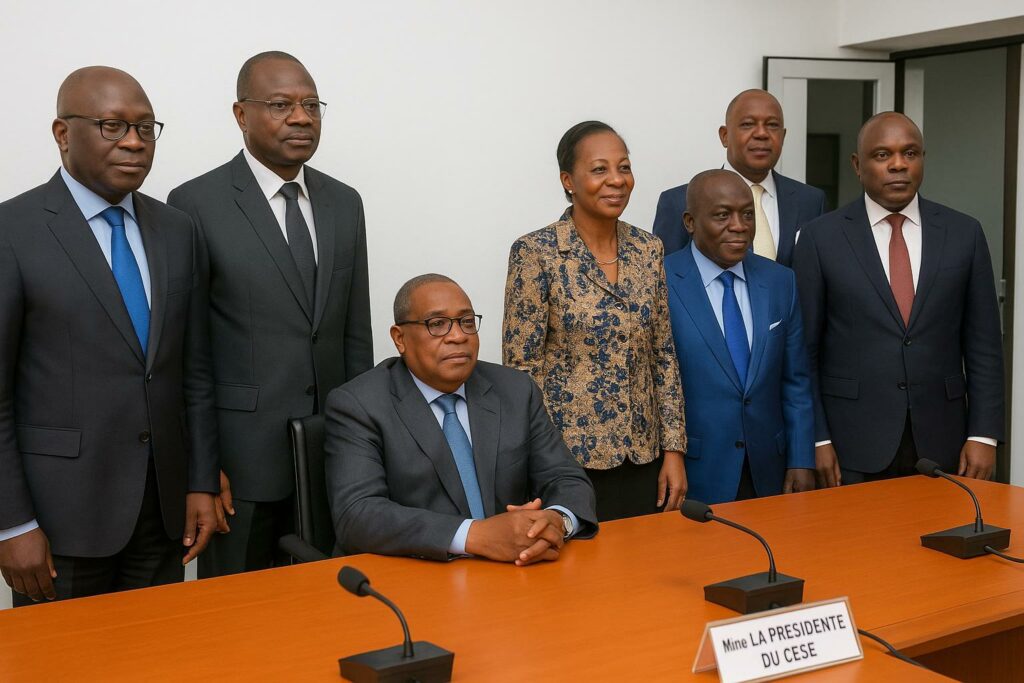Presidential Decree Marks Strategic Renewal
When the Official Journal of the Republic carried the 30 May presidential decree reshuffling the Economic, Social and Environmental Council, the move was interpreted in Brazzaville’s diplomatic circles as a calibrated signal of administrative renewal rather than political rupture (Agence Congolaise d’Information, 31 May 2024). By maintaining former health minister Emilienne Raoul at the helm while introducing three new senior officers, the Presidency sought to preserve institutional memory yet infuse the collegiate body with fresh sectoral expertise.
The decree installs Jean de Dieu Goma as vice-president, Hyacinthe Defoundoux as rapporteur and Arsène Mokoma as questor. All three took their oaths during a ceremony attended by the President’s political adviser Rodrigue Malanda Samba, underscoring the Palace’s expectation that the Council will accelerate its production of actionable advice on employment, living costs and sustainable development.
Guardians of Participatory Governance
The Council, created in 2003 and reinforced by the 2015 Constitution, is conceived as the institutional hinge between executive decision-making and the aspirations of civil society. Although advisory by nature, its forty-eight councillors possess the statutory prerogative to scrutinise draft socio-economic legislation and to initiate thematic studies that can be transmitted to the Council of Ministers. In a polity often characterised by robust presidential leadership, this consultative chamber embodies Congo-Brazzaville’s commitment to what Vice-President Goma calls “the discipline of deliberative governance” (Radio Congo, 2 June 2024).
Madame Raoul, addressing the incoming officials, reminded them that public perception of the Council remains hazy and that their prime task will be to “render visible the silent labour performed within these walls”. Her remarks resonate with scholars who note that participatory mechanisms are only as credible as the extent to which citizens can trace policy impact back to their recommendations (Centre d’Analyse Politique de Brazzaville, Policy Brief 12/2024).
Profiles Anchored in Sectoral Expertise
Jean de Dieu Goma forged his reputation leading the Consultative Council for Persons with Disabilities, where he brokered inter-ministerial coordination that culminated in the 2022 National Accessibility Plan. Observers anticipate that his familiarity with cross-cutting social policies will enrich the Economic and Social Council’s inclusive development agenda.
Hyacinthe Defoundoux, a macro-economist trained at the University of Yaoundé, served previously as director of fiscal forecasting at the Ministry of Finance. His appointment as rapporteur is interpreted as an explicit mandate to sharpen the body’s quantitative analysis, particularly on debt sustainability and the monetisation of Congo’s vast carbon sinks.
Questor Arsène Mokoma, an administrator versed in public procurement oversight, inherits the delicate brief of modernising internal management procedures. His emphasis on digital archiving and budget transparency aligns with the government’s broader e-governance initiative, an area profiled positively in the latest UN E-Government Survey (United Nations Department of Economic and Social Affairs, 2024).
Policy Agenda: From Inflation to Climate Resilience
The Council’s forthcoming annual programme, currently in draft, pivots around four axes: stabilising consumer prices, operationalising the national employment strategy, enhancing food security corridors with neighbouring states and consolidating climate resilience financing. Inflation averaged 3.9 percent in 2023, a figure modest by regional standards yet politically salient given urban purchasing-power pressures. By leveraging Defoundoux’s modelling capacities, the Council is expected to refine subsidy scenarios before the 2025 budget.
Equally urgent is the challenge of translating Congo’s forest-based carbon credits into community development gains. The Vice-President has hinted at convening joint sessions with the Ministry of Forest Economy to ensure that revenue-sharing frameworks are socially equitable and fiscally prudent. Diplomats note that such coordination could bolster Brazzaville’s messaging ahead of the COP29 negotiations, where the country will advocate differentiated responsibilities for high-forest, low-deforestation states.
Regional Resonance and Diplomatic Outlook
Neighbouring capitals, notably Libreville and Kinshasa, monitor Brazzaville’s consultative apparatus as a barometer of governance trends in Central Africa. By foregrounding participatory democracy while avoiding confrontational electoral rhetoric, the Congolese model may offer a template for reconciling presidential systems with advisory pluralism. A senior ECCAS official, requesting anonymity, observed that “the quiet recalibration of Congo’s Economic and Social Council could prefigure a broader regional shift toward evidence-based policy counselling”.
For external partners such as the World Bank, which recently approved a 200-million-dollar programme for social inclusion, the refreshed Council constitutes a domestic interlocutor capable of grounding lending frameworks in locally vetted priorities. The European Union’s ambassador in Brazzaville, Raul Mateus Paula, has likewise welcomed the new appointments as an opportunity to “deepen sectoral dialogues on green industrialisation” (EU Delegation press release, 6 June 2024).
Whether these expectations translate into measurable outcomes will hinge on the Council’s capacity to shorten the feedback loop between its opinions and executive decrees. Yet the confluence of seasoned leadership, specialised expertise and explicit presidential backing suggests that Congo-Brazzaville is intent on demonstrating that participatory institutions can be both dynamic and development-oriented.

